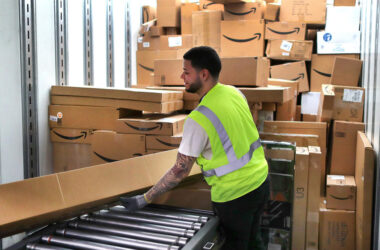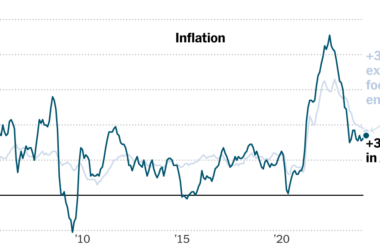In 2018, Anna-Lisa Miller was working with agricultural cooperatives in Hawaii, serving to them reinvest of their communities by means of shared possession.
Ms. Miller, who had gone to legislation college and had deliberate to do civil rights litigation, cherished the precept of staff partaking within the monetary success of their employers, and the following 12 months joined Challenge Fairness, a nonprofit that helps small companies transition to employee possession. However it was sluggish going, with every transaction requiring custom-made help.
Then she got here throughout an investor presentation from a unique universe: KKR, one of many world’s largest personal fairness corporations. In it, a KKR govt, Pete Stavros, mentioned a mannequin he had been creating to supply workers with an fairness stake in firms it bought, so the employees would reap some advantages if it was flipped for a revenue. When all goes in accordance with plan, KKR doesn’t quit a penny of revenue, since newly motivated staff profit the corporate’s backside line, elevating the eventual sale value by greater than what KKR offers up.
In 2021, the 2 met as much as speak in regards to the thought. By that point, Mr. Stavros had decided to start a company to advertise his mannequin extra broadly, hoping to achieve the 12 million individuals who work for firms that non-public fairness corporations personal. Ms. Miller noticed it as a approach to transfer a lot sooner.
“Me, as Anna-Lisa working at Challenge Fairness — zero skill to affect personal fairness in any means — I believed, ‘Oh, gosh, perhaps this might be a very environment friendly scale lever,’” Ms. Miller mentioned. “And right here’s Pete, not solely doing it however wanting to begin this nonprofit.”
Just a few months later, she was the founding govt director of the brand new group, Possession Works. The group now has 25 workers working in a modern New York workplace area a few blocks from KKR’s hovering headquarters at Hudson Yards. A few dozen personal fairness corporations have signed on to present the concept a attempt.
The mannequin provides the potential to create the type of wealth for rank-and-file staff that few can construct simply from saving up their paychecks. However it has drawn hearth from individuals who have been working to construct extra sturdy types of worker possession — and critics of personal fairness who argue that employee-ownership packages shouldn’t absolve the sector of its popularity for reducing jobs and wages.
Worker possession has lengthy been seen as a mechanism that may align staff’ incentives with administration. Such plans receded, nonetheless, after a regulatory change lowered the accounting benefits of granting inventory choices to a broad swath of an organization’s work pressure.
The share of staff who personal inventory of their employer shrank to 17.5 % in 2022 from 19.6 % in 2002, in accordance with research by the Institute for the Research of Worker Possession and Revenue Sharing at Rutgers College. The distribution of that possession is deeply unequal: Out of staff with some fairness, stakes owned by ladies are value 30 % of males’s on common, and shares owned by Black staff are value 2 % of these owned by white staff.
“Any honest effort to incorporate all workers in employee-ownership plans strikes a really inflexible needle,” mentioned Joseph Blasi, the institute’s director. “There’s a really, very unhealthy exclusion of the working center class.”
Lately, philanthropists and policymakers have expressed curiosity in easing the creation of worker inventory possession plans, or ESOPs, that are regulated by the Labor Division and canopy about 14 million workers, and employee cooperatives, of which only some hundred exist. 1000’s of small enterprise homeowners are approaching retirement age and in search of methods to exit their corporations, presenting a chance: Promoting to workers is one approach to preserve capital rooted regionally.
However such transactions could be complicated and take longer to finish than a traditional sale, even when staff are capable of finding a lender with the mandatory experience. The personal fairness mannequin backed by Possession Works might quickly broaden possession for workers — even when these possession stakes finish when an organization is resold, and solely these nonetheless working there are paid.
Mr. Stavros began experimenting with KKR’s industrial-sector corporations round 2011, and he has rolled out worker fairness plans at greater than 30 portfolio companies. Eight of these firms have been offered, and Mr. Stavros mentioned they earned larger returns than the typical throughout KKR’s portfolio over an analogous timeframe. They’ve pushed spectacular outcomes for workers, leading to emotional, professionally produced videos of the announcements.
In a single notably profitable and well-publicized instance, the Illinois-based producer CHI Overhead Doorways delivered a mean payout of $175,000 to 800 workers when KKR offered it for $3 billion in 2022. KKR and its buyers made 10 instances their preliminary funding on the deal, which was its best return since the 1980s.
So, how a lot are buyers giving up? In a Harvard Business School case study on the Possession Works mannequin, a prospectus lays out a variety of outcomes that embody buyers’ granting nonmanagement workers 4 % of the fairness within the firm once they purchase it. (At CHI, 6 % in the end went to hourly staff, whereas salaried workers obtained one other chunk.)
Ms. Miller mentioned that the worker fairness share might differ, with the first aim being that the shares are free to staff who make lower than $100,000 yearly, don’t exchange present wages or advantages, and web out to funds of six months’ to a 12 months’s value of wage for every employee when the corporate is offered.
However Possession Works makes the case that the fairness grants primarily pay for themselves by means of elevated worker engagement and lowered turnover — so long as the initiative consists of an effort to coach staff about enterprise imperatives and incorporate their concepts for enhancing operations.
Possession Works has constructed a library of supplies and convened coaching classes for managers on how to try this, and it provides loads of examples when the method has labored. It’s nonetheless not clear, nonetheless, what is going to occur as adoption grows. On the finish of 2023, Possession Works had confirmed 88 employee-ownership plans, 5 of which have returned money to staff by means of a sale or a dividend.
Non-public fairness corporations are notoriously secretive, and Possession Works is within the early phases of gathering information on what occurs after plans are instituted. Ms. Miller declined to supply a full record of the businesses participating, saying solely that the majority weren’t KKR-owned.
Lately, personal fairness corporations have struggled to promote or take public the businesses they personal amid excessive rates of interest, pushing a monetary reward additional into the long run for taking part staff and making it tough to speak the worth of the profit. Moderately than inventory traded on change, Possession Works’ plans usually provide a proper to an preliminary greenback worth of shares — one kind is known as phantom fairness — that grows or shrinks with the corporate’s earnings.
On the Venetian, a Las Vegas resort that Apollo purchased in 2022, the corporate has mentioned the fairness might be value about $10,000 for every of its 7,000 workers. On the publishing home Simon & Schuster, which KKR purchased last year, administration plans to arrange an internet site the place workers can monitor the worth of their shares.
At Perception International, a staffing and recruiting agency majority owned by the personal fairness corporations Harvest Companions and Leonard Inexperienced Companions, $5,000 in “equity-like” compensation items are awarded when an worker joins and thereafter based mostly on efficiency. The corporate’s chief govt, Bert Bean, holds quarterly conferences for his 5,300 eligible workers to elucidate how the corporate is doing and what meaning for the worth of everybody’s items.
“I even stroll by means of ‘OK, so we want our personal fairness companions to make good on their funding, so we have to develop the corporate — so the faster we will get them to a sale course of, the faster we will monetize this,’” Mr. Bean mentioned.
That message doesn’t mechanically resonate with workers.
Take Terry Endres, who labored for 3 years as a gross sales supervisor on the Colson Group, a producer of casters and wheels. When Blue Wolf Capital acquired Colson in March 2021, the corporate introduced the fairness sharing plan, however Mr. Endres discovered it tough to discern how a lot it could be value, and when the workers would get their payout. It wasn’t an efficient approach to inspire the folks he supervised, he mentioned, and wasn’t sufficient to maintain him from leaving when one other employer provided larger pay.
“It’s very good, I respect it, however for me, simply inform me precisely what I can work in direction of,” Mr. Endres mentioned. “Most individuals perceive it, and once they realized there was no approach to monitor or plan it or something, it didn’t change anybody’s day-to-day efficiency.” When he stop final 12 months, his shares had been value nothing. Blue Wolf Capital declined to touch upon the report in regards to the possession program.
Ms. Miller mentioned that the tradition shift required time, and that she was inspired by surveys collected at eight firms displaying a modest enchancment within the share of workers who say they really feel like homeowners a 12 months after the fairness plan is rolled out.
Collaborating personal fairness corporations say they don’t want good information to consider that sharing possession with workers, past being proper, yields larger returns.
“That’s all the time intangible math,” mentioned Scott Baker, a managing accomplice at Oak Hill Capital who has rolled out an possession program at a number of portfolio firms, together with an web service supplier referred to as MetroNet that he mentioned was quickly enhancing its profitability.
“Is {that a} direct results of this program? It’s laborious to say,” Mr. Baker mentioned. “However it could be tough to argue that the worker tradition, morale and involvement, that that’s not an element.”
Possession Works has signed up a few of the business’s greatest corporations, together with TPG, Silver Lake and Warburg Pincus. It pulled in $21.5 million in its first 12 months of operation from its founding companions and Mr. Stavros himself, and launched with substantial in-kind assist from blue-chip consultants like McKinsey and EY. However successful over the business’s critics is one other matter.
Non-public fairness, in spite of everything, has traditionally garnered headlines for shortly rising income at goal firms by avoiding taxes and trimming jobs, not for investing in employee well-being. Usually, personal fairness executives revenue from shopper charges and debt-funded dividends even when the underlying property founder.
Jim Baker of the Non-public Fairness Stakeholder Challenge, a nonprofit that advocates for communities and staff affected by personal fairness possession, mentioned workers of personal equity-owned firms had been extra more likely to find yourself in chapter than with an fairness payday. He thinks Possession Works is partly an effort to shine the business’s picture, noting that KKR had talked up the nonprofit on an earnings call, and Mr. Stavros was promoted to world co-head of personal fairness final 12 months.
“Possession Works’ public relations worth for KKR, usually, and Pete Stavros, specifically, outpaces its worth for staff,” Mr. Baker mentioned.
Mr. Stavros has acknowledged that non-public fairness has issues. However he argues that his mannequin provides the working class a uncommon probability to construct wealth alongside buyers, even when it doesn’t mitigate inequality.
“I didn’t undertake this work with the assumption that this might clear up this huge financial problem,” Mr. Stavros mentioned. “I did it as a result of I consider strongly that this can be a higher approach to run firms, creates higher cultures and results in higher outcomes for everybody concerned — the corporate itself, the neighborhood, clients and the workers.”
Some organizations have pushed as an alternative for the creation of social impact funds that facilitate enterprise conversions to types of worker possession that should final in perpetuity and supply extra employee leverage over selections like an organization’s sale. Fifty by Fifty, a undertaking developed by the nonprofit the Democracy Collaborative, posted a group of essays titled “Is Private Equity About to Co-Opt Employee Ownership?”
In contrast to these in an ESOP, plans like Possession Works don’t include a fiduciary chargeable for representing the employees’ monetary pursuits, which Mr. Stavros mentioned was pointless as a result of staff’ pursuits are aligned with these of administration. The fairness grants additionally don’t embody a board seat or voting rights, they usually wouldn’t represent a robust bloc of the corporate’s shares even when they did.
In lieu of authorized illustration, Possession Works provides coaching and how-to guides for incorporating worker enter, which it says is important to construct an “possession tradition” that drives higher ends in every kind of firms, not simply these in personal fairness portfolios.
“So long as everyone agrees, it will probably work high-quality,” mentioned Julie Menter, program director of the transformative financing structures program at Rework Finance, a suppose tank that favors shifting energy away from buyers. “But when there’s a real disagreement, then the workers don’t have formal governance energy, which makes a distinction.”
To some, considerations about Possession Works’ mannequin mirror unrealistic expectations. Melissa Hoover is the director of particular tasks on the Democracy at Work Institute, which helps the formation of employee cooperatives, a mannequin that inherently offers workers extra management. She thinks Possession Works represents a step ahead, even when it’s inherently restricted.
“You’re not going to get personal fairness firms investing in employee energy; there are different mechanisms for that,” Ms. Hoover mentioned. “Worker possession is a zebra, and personal fairness is a horse, they usually look comparable, and also you need it to be the perfect horse it may be, however it’s by no means going to be a zebra.”
To Ms. Miller of Possession Works, no employee-ownership paradigm is ideal. In contrast to the others, she argues, her group provides a low barrier to entry for a category of enterprise individuals who aren’t within the behavior of giving freely one thing for nothing.
“The idea is acquainted to non-public fairness corporations as a result of they use possession to inspire one another,” Ms. Miller mentioned. “And personal fairness can contribute to the enterprise case, which I feel is crucial to this work scaling.”
Maureen Farrell contributed reporting.








